Cost of living: Unpaid carers going without basics
 Family photo
Family photoUnpaid carers say increased financial pressures mean they are unable to buy even basic essential items and feel forgotten by those in power.
A young carer who supports three disabled adults said her family could not afford haircuts and underwear.
Those who care for someone for at least 35 hours a week can claim £69.70 a week but do not get paid extra for caring for more than one person.
The Welsh government said it valued unpaid carers.
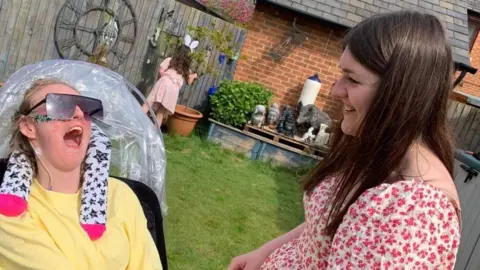 Family photo
Family photoTegan Godden, 19, from Newport, lives with her grandparents, her two uncles, her aunt and her brother.
Her grandmother is the primary carer for three disabled family members - Tegan's grandfather, one of her uncles and her aunt.
Tegan supports her grandmother by taking her relatives for days out or to hospital appointments, giving medication, washing her aunt and helping around the house, all while running her own cake and hot food business full time.
Tegan said her family struggled financially - her grandmother's caring responsibilities mean she is unable to work and she can only claim Carer's Allowance for one person she cares for.
"With the number of mouths she has to feed it's really hard," said Tegan.
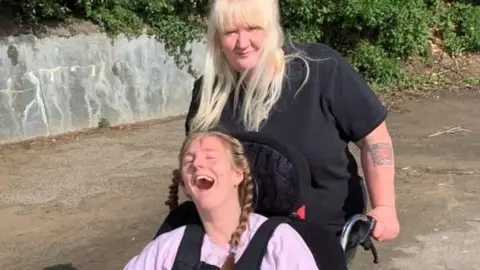 Family photo
Family photoShe said she believed her grandmother often skipped meals and she often witnessed her going without other essentials.
"I see my nan not even being able to buy socks or pants, walking around the house with holes in her socks," she said.
"It's really upsetting seeing what she has to go through.... she's so selfless. It's upsetting a lot of the time for us."
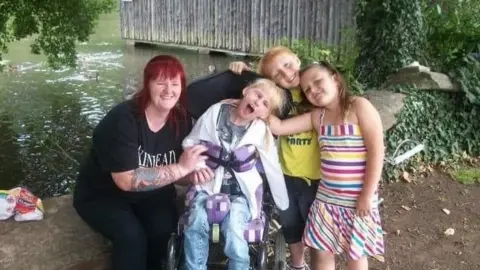 Family photo
Family photoTegan wants to see people like her grandmother paid for the work they do.
"If she went out and worked as a carer for other people, she'd be paid by the hour or by the day," she said.
The family try to make ends meet by cooking in bulk and sticking rigidly to shopping lists, Tegan said.
"Everything's gone up in price and the government expects people to eat healthy and eat nutritious meals but the cheapest food in the supermarkets is the most unhealthy that you could buy," she said.

"We try to keep as healthy as we possibly can but it's just the biggest struggle, we just pick meals that we're able to afford."
She said another struggle was the cost of energy.
The family live in a specially adapted council house where two three-bedroom properties have been knocked into one, making it expensive to heat.
The family also uses lots of electric equipment for her aunt, such as a blender for her meals, her mobility bed and feeding pump which pushes their bills up further.
In a recent UK-wide survey of 1,109 young carers by Carers Trust, 56% of respondents said the cost-of-living crisis was always or usually hitting them and their family.
Non-profit organisation Carers UK has said unpaid carers are facing unprecedented financial difficulties because of the UK's current cost of living crisis.
It said without urgent support from government it was "extremely worried that many will simply be unable to cope".
"We don't want charity," said Tegan.
"We don't want to be treated any differently or pitied on but I think there's so many other families like us who are struggling and need support and just don't have it."
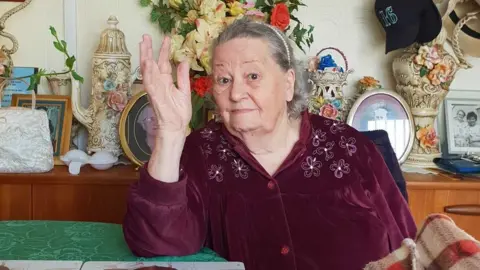 Family photo
Family photoShaun Moore, 60, from Blackwood in Caerphilly county has been an unpaid carer for four years after leaving his job to care for his mother who had dementia.
His mother died two years ago and weeks later his father had a stroke. Shaun now cares for his father full time.
"I've got to do everything for Dad," he said.
"Your life stops dead in its tracks.
"I'm not blaming my father or my mother for that because it's my duty to look after them, the same as they would do for me ."
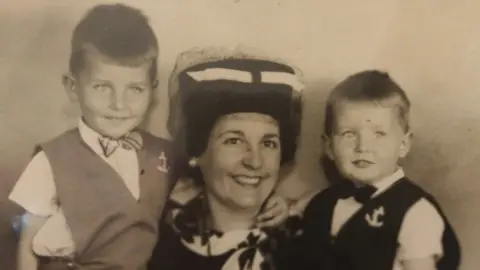 Family photo
Family photoShaun said it was very difficult to have any kind of life outside of caring for his father.
"You can't go anywhere, and you can't do nothing [sic]," he said.
"I can't go out with friends for a night out and have a pint because I know for a fact I've got to keep my wits about me. If I have a phone call I would have to get back home straight away.
"You've got no life.
"Mentally it's draining. I have about one hour a night sleep - Dad wants to go to the toilet five, six, seven, eight times a night.
"We don't moan about it because we have to do it but it strips you of everything."
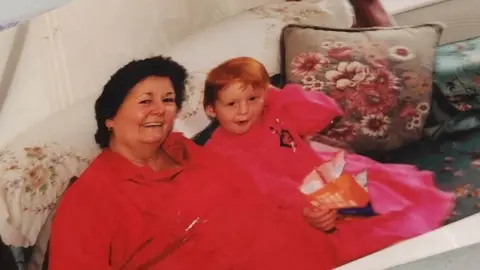 Family photo
Family photoShaun's father has two carers who call to see him for 15 minutes in the morning and again in the evening.
He claims £69.70 a week in Carer's Allowance and £576 in Universal Credit a month out of which he pays £420 rent as well as all his other outgoings such as running his car, food and all his bills.
"We are the forgotten," he said of himself and other unpaid carers.
"What would the government do if carers like myself - not that we would - but if we turned around and said 'we can't do this anymore. You're going to have to take all our parents and loved ones into care, we're not doing it'," he said.
"They couldn't cover it. They haven't got enough places to put people and they haven't got enough carers. It would be pandemonium."
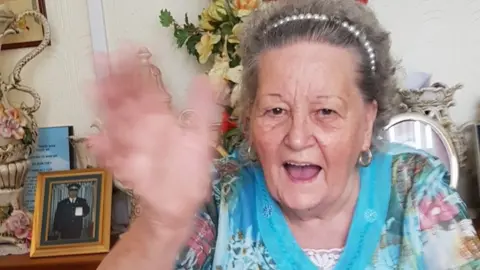 Family photo
Family photoHe believes people like himself are "saving the government thousands of pounds".
"It's not fair," he said.
He wants to see an increase to the benefits unpaid carers are able claim and would like to be taken off benefits and paid a wage for the care he gives.
"I'm not saying I want thousands, but I could do without a little bit extra to make life a little bit easier, so I wouldn't have to struggle," he said.
'Feeling of isolation'
Alan Wilson, 78, from Pontypridd, Rhondda Cynon Taf, has cared for his wife Coral, 79, for almost 40 years.
Coral was diagnosed with sensory neuropathy in her mid-40s and in the past four years she has had two strokes and a bleed to the brain and now needs 24/7 care.
"It is the lack of support and the feeling of isolation," he said.
"I feel constantly tired and I fear what the future holds for Coral.
"If I was to be taken ill how would Coral manage? That is my major concern."
Alan gets 12 hours a week respite which he uses to shop, go to appointments or sleep.
"Without that I'd really struggle," he said.
Alan receives his state pension and a private work pension which means he is unable to claim Carer's Allowance.
Those who care for someone but earn more than £128 a week or receive other benefits such as a state pension are not entitled to Carer's Allowance.
"I feel a bit aggrieved about it," he said.
"When I was working I paid 12% of my pay into the private pension.
"Don't get me wrong, I'm happy to care for my wife but if she was in a nursing home you're looking at £1,500 a week and I think the carers are saving the government millions if not billions every year."
A Welsh government spokesperson said: "We identify and value unpaid carers and are committed to helping carers access the support they are entitled to.
"Our national Carers Delivery plan sets out how we will meet this commitment. We are working with our partners to help more carers access advice and support, including their right to a carer's needs assessment.
"We have listened to unpaid carers' calls for help with respite and are investing £9m into a new Short Breaks Scheme. Our £4.5m Carers Support Fund has also helped thousands of carers access financial support and services."
A UK government spokesperson said: "We know families caring for those with disabilities face extra costs, which is why we are increasing disability benefits in line with inflation, making an extra £150 disability support payment as well as £900 cost of living help for those on means-tested benefits and saving households around £1,300 on energy bills this winter."
Tegan, Shaun and Alan first spoke to spoke to Dot Davies on BBC Radio Wales
